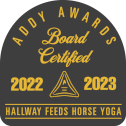Winter Horse Nutrition
Winter Horse Nutrition
As winter settles in, many horse owners face a similar issue: what to feed their horses when pastures are frozen, and hay may not be as accessible or fresh as they would like. Can you forgo forage in favor of an all-grain diet? Of course not. We do, however, have a few suggestions for helping ensure your horse nutrition program stays on track, even if you’re not headed south for the season.
Horse Nutrition Basics
Forage, of course, should be the basis of every horse’s diet. Not only is it a source of fiber, but it’s also essential to keep the horse’s digestive tract working efficiently.
The amount of forage an individual horse need varies. A good starting point is 1.5% of the horse’s weight. For example, if your horse weighs 1,000 pounds, it typically needs around 15 pounds of forage each day; note that the amount could be more or less, depending on age and physical activity.
Why is forage so important? For starters, it helps manage the microorganisms naturally found in the hindgut, which keeps the digestive system healthy and running as it should. Forage is also essential in maintaining a horse’s warmth; as it’s fermented in the hindgut, it produces heat to warm the horse from the inside.
Hay: An Important Source of Forage
In many parts of the U.S., horse owners depend on hay for most of their horse’s forage needs over the winter. We always recommend you examine your hay to ensure it’s good quality and free from mold. Hay testing is another way to know the quality of your hay and what nutrients it will contribute to your horse’s ration.
Horse Nutrition When Hay Supplies are Low
If you should happen to run low on hay—or can’t access good quality hay—your horse nutrition program will need a few tweaks.
Next, you may want to consider offering chopped hay, offered at Hallway Feeds. However, because it tends to be more expensive than buying hay in bulk, this option won’t be the most economical. There is always the option of purchasing alfalfa cubes or pellets as well.
You could also think about buying a beet pulp rich feed from Hallway Feeds. While it is not a substitute for hay, it does add digestible fiber to your horse’s diet.
If you are in an area where the ground is not frozen, check your fields. If there is grass (even if it’s not necessarily growing), consider letting your horse graze.
Horse Nutrition Beyond the Hay
Of course, feeds are an important part of a winter horse nutrition program. Since most horses in North America aren’t able to graze lush fields this time of year, they rely on the vitamins and other nutrients found in good-quality feeds.
As always, we do not recommend switching up your horse’s feed just for the sake of trying something new. However, if your horse has been losing weight or showing signs of nutritional deficiencies, we encourage you to talk to us about reviewing your horse nutrition program to see if one of our feeds could help.








